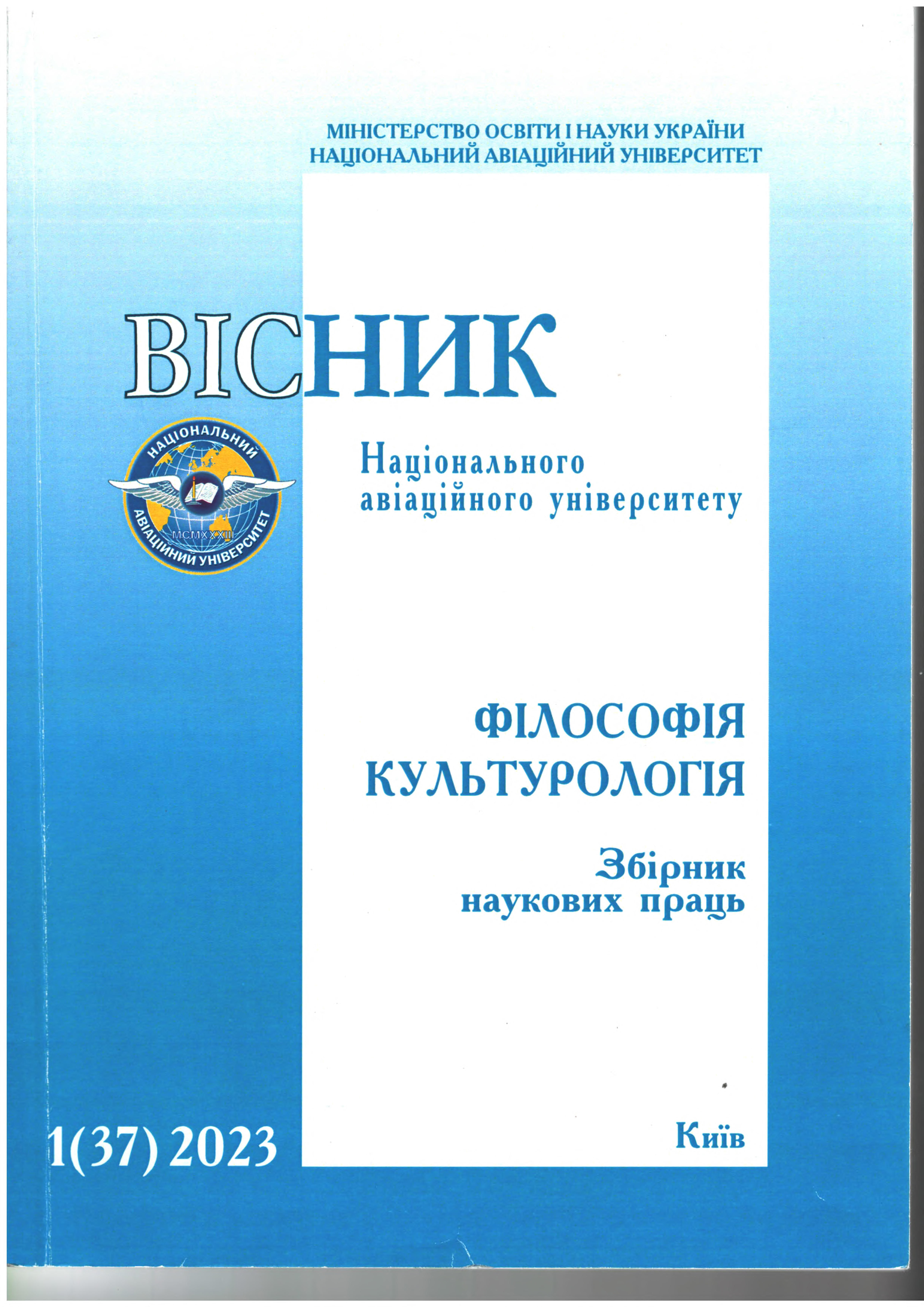DIALOGICITY OF UKRAINIAN CULTURE AS A FACTOR OF ITS DEVELOPMENT
DOI:
https://doi.org/10.18372/2412-2157.37.17592Keywords:
українська культура, міжкультурний діалог, діалогічність, межовість, пограниччя, культурний розвитокAbstract
Introduction. Dialogicity is a concept of non-classical epistemology that helps to analyze knowledge in the unity of cognitive, spatiotemporal
and value dimensions. Determining the dialogic nature of Ukrainian culture becomes important in the light of the latest
research in the field of sociology, psychology, and political science, which raises the question of defining the boundaries of culture in
the modern global world. The aim of the article is to establish the signs of the dialogic nature of Ukrainian culture. The position is
argued that dialogicity is one of the factors of its development. Research methods are the historical method; comparative analysis
of different conceptual approaches to the dialogue of cultures. Also, dialogicity is considered as a methodological principle of a
possible synthesis of the multifaceted nature of cognitive-communicative practices of cultural discourse. Research results. The
practice of dialogue in the Ukrainian cultural tradition, which goes back to the pagan-Christian times, shows the duality of paradigms
in the philosophical culture and is continued by Ukrainian thinkers and polemicists. In this context, the philosophy of H. Skovoroda
appears as a model of classical-rationalist dialogue. At the same time, I. Franko was engaged in the development of ethicalrationalist
practice of dialogue. Special attention is paid to the factor of "borderlineness" of Ukrainian culture, which creates
favorable conditions for comparison and evaluation of other cultures, and therefore – strong grounds for dialogue in a culturalhistorical
sense. The features of Ukrainian culture determined by the search and formation of Ukrainian identity (XX – at the
beginning of XXI century) are singled out: the search for deep, meaningful principles of culture; interweaving of culture with other
civil and social spheres; rethinking the individual creativity of past generations; acceptance of the "other", "alien" into one's culture;
cultural anthropocentrism. Discussion. Since the culture of Ukraine appears as a dialogue, due to the constant search for its
beginnings, Ukrainian philosophers carried out in-depth studies of the history of Ukrainian culture in order to search for its key
features. However, the approaches of Ukrainian thinkers in this context differed somewhat. For example, M. Popovych was more
inclined to the method of criticism of historical facts, debunking of cultural stereotypes and combining the beginnings of Ukrainian
culture with general cultural values. At the same time, S. Krymsky mostly singled out the archetypes of Ukrainian culture, found the
fundamental components of its development, and outlined purely national components of cultural development. Conclusions.
According to the authors, the above-mentioned signs of Ukrainian culture indicate that it is a dialogue of cultures. Ukrainian society
lives in a regime of dialogic cultures, perhaps that is why it is peaceful. It is under such conditions that culture is established, cultural
orientations are outlined, which contribute to the consolidation of society. It is emphasized that the value of the dialogue of cultures
in Ukraine lies in the ability to overcome interethnic misunderstandings and ensure international peace. However, this requires the
will of the participants, following the general methodology and ethical principles of intercultural dialogue processes.
References
Wegerif R. Dialogic, education and technology. Expanding
the space of learning. Delhi, 1989. https://www.researchgate.net/
publication/248663573
Грушевський, М. С. Історія України-Руси. Вступні замітки.
В II т. 12 кн. К.: Наук, думка, 1991. Т. 1. С. 14.
Котовська Ольга Петрівна. Діалог як метод пошуку істини
в українській філософській традиції. Дисертація на здобуття
наукового ступеня кандидата філософських наук за
спеціальністю 09.00.05 – історія філософії – Львівський
національний університет імені Івана Франка, Львів, 2008.
http://www.disslib.org/dialoh-jak-metod-poshuku-istyny-vukrayinskiy-
filosofskiy-tradytsiyi.html
Лисоколенко Тетяна, Карпань Ірина, Рогова Олена
Український екзистенціалізм: поміж філософією та літературою.
GRANI 24 (7-8). C. 13-20.
Попович М. Нарис з історії культури України. К.: «АртЕк»,
728 с.

